How are you doing with understanding your boat’s electrical systems? This is the first of a series of videos and articles where we’ll be exploring the basics of boating electrical systems. This is so that you can be in control which means that you’ll have a safer boat, save money, and easily troubleshoot common problems. Watch the video and then read the article below.
Every cruising sailor knows it’s important to maintain their sails and rigging and keep their engine running smoothly. A lot of attention is also paid to electronics – fancy chart plotters, high definition radar, LED lighting, and more. But owners often neglect an equally important, if not more important, system – electrical!
The electrical systems on a boat can quickly seem complex and overwhelming.
Boat wiring quickly scrambles people’s brains, and electrocution when trying to solve problems is a legitimate fear. Sometimes, a lack of knowledge of your boat’s electrical systems can lead to very serious consequences. Understanding your boat’s electrical systems can take time but it’s worth the effort.
Imagine if you’re a new cruiser staying in a remote anchorage and suddenly, you don’t have enough power to run your fridge or freezer on your boat. You may lose all of your food – not to mention melt your ice for cocktails. While your boat is tied off in a marina, stray electrical current from somewhere nearby may be eating away at your drive shafts. As you cast lines and head out to sea, you may lose your rudders.
What if you leave your boat to explore ashore for a few days without realizing that your automatic bilge pump isn’t operating correctly. You may return to a healthy amount of seawater down below as a result of an unexpected leak.
These marine electrical situations sound extreme – and they are – but they do happen, and not just on pre-owned boats.
Shiny new boats fresh from the factory are just as likely to have electrical issues as new-to-you boats.
By having a basic knowledge of your boat’s electrical systems and following a maintenance routine for those systems, you can avoid these situations and keep your boat happy and healthy.
Here are the basics on how to understand your boat’s electrical systems:
1. Learn how to use the multimeter!
Part of your basic electrical toolkit. The multimeter is your new best friend and a critical tool for your kit! Speaking of kit, make sure you have the basic tools and parts aboard for general electrical maintenance and troubleshooting.
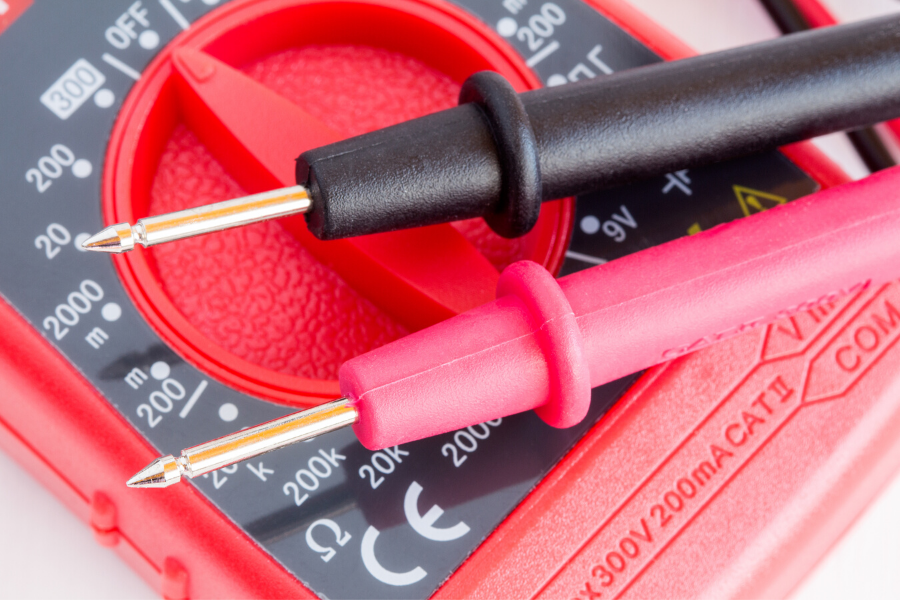
2. Cozy up to your battery bank!
Learn the ins and outs of your boat batteries (including what type of batteries you have), and how to maintain them. Start with our The Beginners Guide To Marine Boat Batteries.
3. What’s your normal?
In order to make sure your batteries and charging system are operating as they should be, you need to learn what’s normal for your systems. What are your battery levels in the morning, midday, and night? Are your charging sources really working like you think they are? What’s normal for a sunny/windy day, versus a cloudy/calm day? Once you learn these normal battery levels, you’ll be able to more quickly identify when things are amiss. Make sure to check out How To Manage Your Boat Battery Bank and How to Increase the Lifespan of Your Batteries.
4. Corrosion – your most common and worst enemy!
Out of all the areas regarding understanding your boat’s electrical systems, this is a biggie. Learn how to identify corrosion, where on your boat to look for it, and how to fix it. There’s a saying with marine electrical troubleshooting – 90% of the time, the problem is corrosion. The other 10% of the time…. it’s usually corrosion.
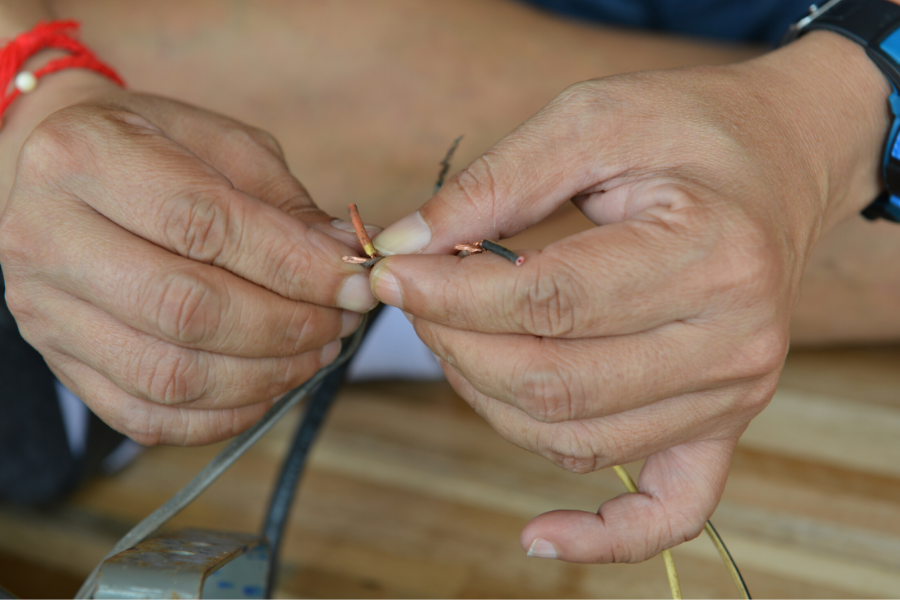
5. Save money with basic troubleshooting.
Has a light stopped working? Or that wonderful fan near your pillow? Learn how to troubleshoot these simple circuits, as well as other common problems, to save you a costly call to a marine electrician for help.
6. Shore power: There’s a right way to hook up.
Life at anchor is grand, but all boaters head into a marina from time to time. Before you plug in and crank the AC, there are critical issues to check and a method to how to connect, to ensure you don’t fry your systems.
7. Know when to call in the professionals.
A big part of understanding your boat’s electrical systems comes down to knowing what you can do and what you should leave for the experts. While you shouldn’t be afraid to tackle some basic electrical issues, there will definitely come a time when calling in an expert is required. Electrical issues can cause massive problems, some of which we’ve already mentioned. If you reach a point when you’re more unsure than sure, find a certified marine electrician in your area and have them assess the issue.
By gaining general knowledge of your electrical systems and cultivating basic troubleshooting skills, you’ll be a much more confident boat owner and feel more comfortable casting lines.
Still intimidated regarding understanding your boat’s electrical systems? Plenty of people are, and that’s understandable. Hiring a marine electrician for an electrical audit of your boat could be just the ticket. He or she will take you through the basics of your systems, explain how to maintain them, show some simple troubleshooting, and identify any immediate problem areas.
Here’s a tool for understanding your boat’s electrical systems!
For a limited time, we’re offering a checklist to help you know what you need to know about your boat’s electrical systems, the basics of troubleshooting, and how to determine when it’s time to call in an expert. Get the Electrical System Audit here.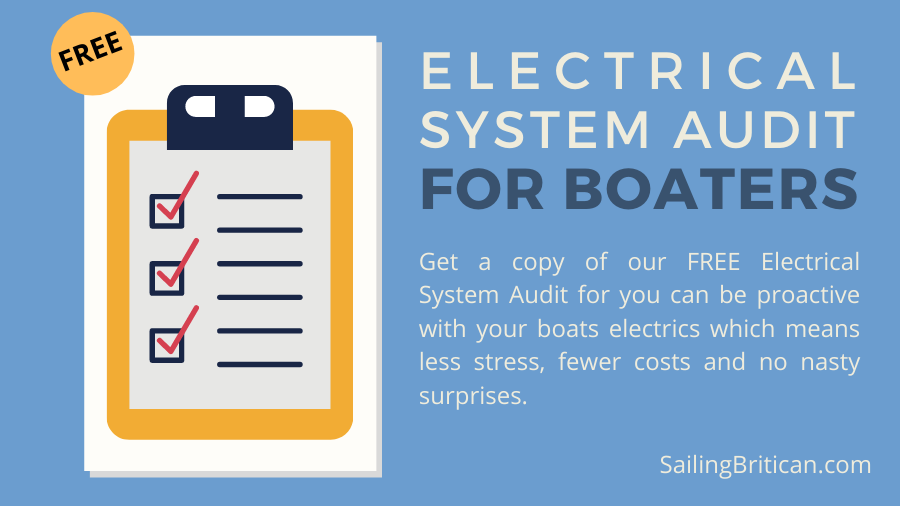
Are you in or going to Grenada?
Make sure to contact Aaron if you’re in Grenada.
Owner Aaron Downey grew up powerboating and began racing sailboats in the U.S. in 2000. He and his wife purchased their first cruising sailboat in 2012. After completing his USCG Master’s license in 2012 and ABYC exams in 2013, Aaron founded CMS as a side business at the repeated requests of fellow boat owners and yacht yards.
His many years designing large, complex land-based technology and electrical systems paired nicely with his experience on the water, creating a unique and robust skillset.
Since then, CMS has seen a long list of happy boat owners in its wake, throughout the U.S. and Caribbean. Let us assist you with your system design or problem-solving – no matter how big or small, simple or complex. From small sailboats to superyachts, simple circuits to large yacht refits, CMS has been there. Click the image below for more information on Aaron from Clarity Marine Systems.
Any questions or comments on our Understanding Your Boat’s Electrical Systems?
Please leave them below.
Other articles of interest
- The Beginners Guide To Marine Boat Batteries (Part 1 of 3)
- How To Manage Your Boat Battery Bank (Part 2 of 3)
- How to Increase the Lifespan of Your Batteries (Part 3 of 3)
- Our Solar Power Installation
- Lithium Battery Upgrade
- How To Prevent Boat Fails
Credits
The articles in this series are guest-written by Meg Downey.
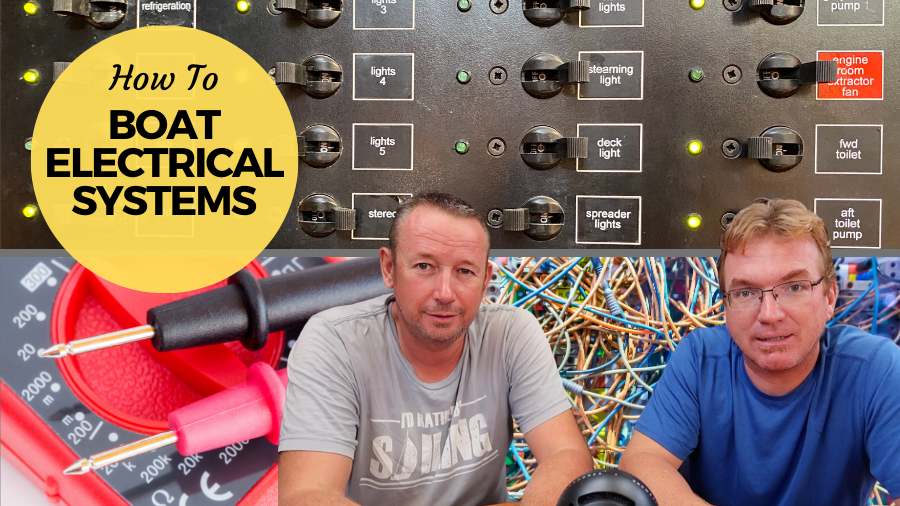
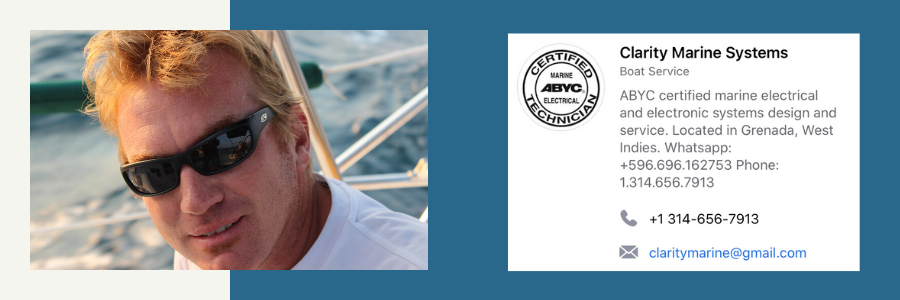
It’s good to know that corrosion is the main reason for electrical problems. My boat has been shutting off a lot lately when I stall and it’s starting to worry me. I’ll be sure to take it to a mechanic and see what’s wrong with my boat.